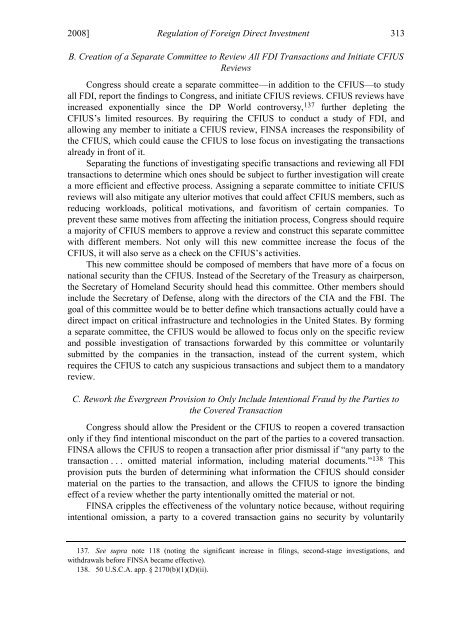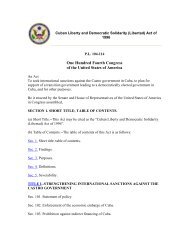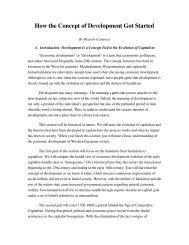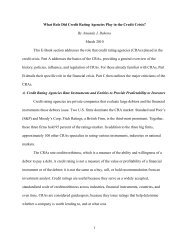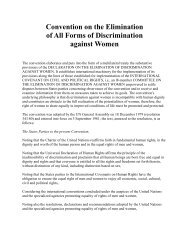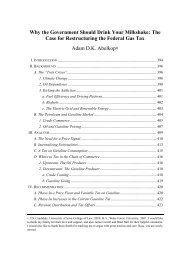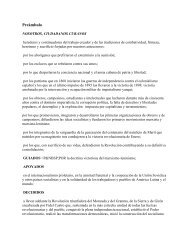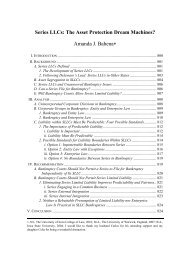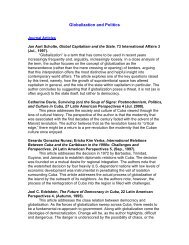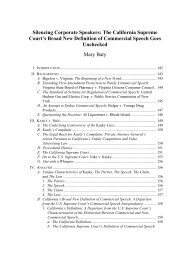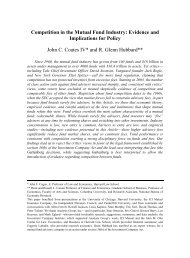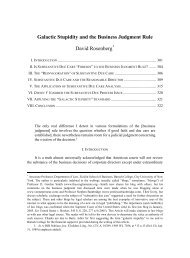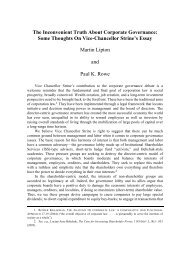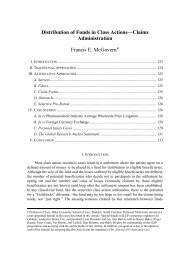Regulation of Foreign Direct Investment After the Dubai Ports ...
Regulation of Foreign Direct Investment After the Dubai Ports ...
Regulation of Foreign Direct Investment After the Dubai Ports ...
Create successful ePaper yourself
Turn your PDF publications into a flip-book with our unique Google optimized e-Paper software.
2008] <strong>Regulation</strong> <strong>of</strong> <strong>Foreign</strong> <strong>Direct</strong> <strong>Investment</strong> 313<br />
B. Creation <strong>of</strong> a Separate Committee to Review All FDI Transactions and Initiate CFIUS<br />
Reviews<br />
Congress should create a separate committee—in addition to <strong>the</strong> CFIUS—to study<br />
all FDI, report <strong>the</strong> findings to Congress, and initiate CFIUS reviews. CFIUS reviews have<br />
increased exponentially since <strong>the</strong> DP World controversy, 137 fur<strong>the</strong>r depleting <strong>the</strong><br />
CFIUS‘s limited resources. By requiring <strong>the</strong> CFIUS to conduct a study <strong>of</strong> FDI, and<br />
allowing any member to initiate a CFIUS review, FINSA increases <strong>the</strong> responsibility <strong>of</strong><br />
<strong>the</strong> CFIUS, which could cause <strong>the</strong> CFIUS to lose focus on investigating <strong>the</strong> transactions<br />
already in front <strong>of</strong> it.<br />
Separating <strong>the</strong> functions <strong>of</strong> investigating specific transactions and reviewing all FDI<br />
transactions to determine which ones should be subject to fur<strong>the</strong>r investigation will create<br />
a more efficient and effective process. Assigning a separate committee to initiate CFIUS<br />
reviews will also mitigate any ulterior motives that could affect CFIUS members, such as<br />
reducing workloads, political motivations, and favoritism <strong>of</strong> certain companies. To<br />
prevent <strong>the</strong>se same motives from affecting <strong>the</strong> initiation process, Congress should require<br />
a majority <strong>of</strong> CFIUS members to approve a review and construct this separate committee<br />
with different members. Not only will this new committee increase <strong>the</strong> focus <strong>of</strong> <strong>the</strong><br />
CFIUS, it will also serve as a check on <strong>the</strong> CFIUS‘s activities.<br />
This new committee should be composed <strong>of</strong> members that have more <strong>of</strong> a focus on<br />
national security than <strong>the</strong> CFIUS. Instead <strong>of</strong> <strong>the</strong> Secretary <strong>of</strong> <strong>the</strong> Treasury as chairperson,<br />
<strong>the</strong> Secretary <strong>of</strong> Homeland Security should head this committee. O<strong>the</strong>r members should<br />
include <strong>the</strong> Secretary <strong>of</strong> Defense, along with <strong>the</strong> directors <strong>of</strong> <strong>the</strong> CIA and <strong>the</strong> FBI. The<br />
goal <strong>of</strong> this committee would be to better define which transactions actually could have a<br />
direct impact on critical infrastructure and technologies in <strong>the</strong> United States. By forming<br />
a separate committee, <strong>the</strong> CFIUS would be allowed to focus only on <strong>the</strong> specific review<br />
and possible investigation <strong>of</strong> transactions forwarded by this committee or voluntarily<br />
submitted by <strong>the</strong> companies in <strong>the</strong> transaction, instead <strong>of</strong> <strong>the</strong> current system, which<br />
requires <strong>the</strong> CFIUS to catch any suspicious transactions and subject <strong>the</strong>m to a mandatory<br />
review.<br />
C. Rework <strong>the</strong> Evergreen Provision to Only Include Intentional Fraud by <strong>the</strong> Parties to<br />
<strong>the</strong> Covered Transaction<br />
Congress should allow <strong>the</strong> President or <strong>the</strong> CFIUS to reopen a covered transaction<br />
only if <strong>the</strong>y find intentional misconduct on <strong>the</strong> part <strong>of</strong> <strong>the</strong> parties to a covered transaction.<br />
FINSA allows <strong>the</strong> CFIUS to reopen a transaction after prior dismissal if ―any party to <strong>the</strong><br />
transaction . . . omitted material information, including material documents.‖ 138 This<br />
provision puts <strong>the</strong> burden <strong>of</strong> determining what information <strong>the</strong> CFIUS should consider<br />
material on <strong>the</strong> parties to <strong>the</strong> transaction, and allows <strong>the</strong> CFIUS to ignore <strong>the</strong> binding<br />
effect <strong>of</strong> a review whe<strong>the</strong>r <strong>the</strong> party intentionally omitted <strong>the</strong> material or not.<br />
FINSA cripples <strong>the</strong> effectiveness <strong>of</strong> <strong>the</strong> voluntary notice because, without requiring<br />
intentional omission, a party to a covered transaction gains no security by voluntarily<br />
137. See supra note 118 (noting <strong>the</strong> significant increase in filings, second-stage investigations, and<br />
withdrawals before FINSA became effective).<br />
138. 50 U.S.C.A. app. § 2170(b)(1)(D)(ii).


